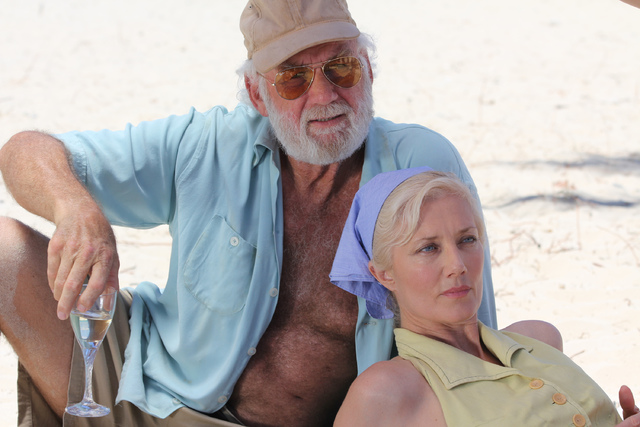Ernest Hemingway has been broadly and almost constantly mischaracterized since the first copy of The Sun Also Rises rolled off the presses, which is what happens when a writer’s larger-than-life personality eclipses the writing itself. A radical prose stylist and an intensely perceptive observer, Hemingway is still lazily peddled as an exemplar of outmoded machismo, an image that doesn’t ring true if you actually read the writing.
Movie portrayals of Hemingway have been less misleading, but that doesn’t mean they’ve been good. A few films have gotten flavor from the Lost Generation Hemingway of Paris, including Bruce McGill’s feisty turn in Jill Godmilow’s unfortunately forgotten Waiting for the Moon (1987) and the amusingly intense Kevin O’Connor in Alan Rudolph’s The Moderns (1988). It’s been a tough slog otherwise. The intriguing casting of Clive Owen, in Hemingway & Gellhorn (2013), ran afoul of a chuckleheaded script, while In Love and War (1996) must surely be the nadir—a fling at dramatizing Hemingway’s romance with a nurse after he was injured in World War I, with Chris O’Donnell (between Batman movies) as the future author.
Papa: Hemingway in Cuba is based on the experiences of screenwriter Denne Bart Petitclerc, a onetime Miami Herald reporter who wrote a fan letter to Hemingway and became a frequent visitor to the author’s Havana home in the late 1950s. The film begins with an episode from Petitclerc’s childhood, when the Montesano native—called Ed Myers in the movie—was brought to Seattle by his father to see the Christmas tree at The Bon Marché and abandoned there. Jumping to adulthood, Myers (Giovanni Ribisi) is warmly welcomed by Hemingway (Adrian Sparks) and wife Mary (Joely Richardson) at their turbulent Havana estate. Hemingway’s physical abilities are deteriorating, the couple snipe at each other, and it seems the U.S. government has it in for the celebrity author. Meanwhile, Castro’s rebels are closing in on a coup d’etat, and Hemingway may have gotten himself mixed up in the action.
There are reasons to look at Papa. This is the first U.S. feature made in Cuba in over 50 years, and producer/director Bob Yari got permission to shoot at Finca Vigia, the actual Hemingway home there, as well as the legendary Floridita bar. So some of the humid atmosphere of the real Havana seeps into the picture, and the house—the staging ground for emotional blowouts—is a genuinely elegant setting for the drama, helping us survive Yari’s generally pedestrian directing touch.
The film’s main source of interest comes from Adrian Sparks, a well-traveled (including the UW School of Drama) actor whose resemblance to the real Ernest Hemingway is striking—the beefy frame and the white beard are convincing from the start, even if Yari gives Hemingway a hokey introduction, filmed against the sunlight like Lawrence of Arabia. More important, Sparks’s gentle, underplayed approach suggests Hemingway’s extreme sensitivity, without stinting on the alcoholic rages and the egomania when those need to be tapped. In one scene, he is addressed by an unidentified character played by Mariel Hemingway, the writer’s granddaughter—a slightly surreal moment.
Because the story is presented partly as fiction, it’s unclear how much of Petitclerc’s script is meant to be taken literally. At one point he suggests that the writer’s increasing paranoia might not have been entirely delusional; we’re told that the FBI and J. Edgar Hoover were in fact gunning for Hemingway, for reasons that sound utterly bizarre … except that we’re talking about J. Edgar Hoover here. This anecdote briefly injects the plodding storytelling of Papa with a jolt of pulp fiction, and you could imagine someone taking that scrap of plot and creating something crazily enjoyable out of it. Not this movie, though—it means well, but its stolid approach dooms the enterprise to dull respectability. Rated R for language, sexuality, some violence and nudity. Opens April 29 at Sundance Cinemas.






